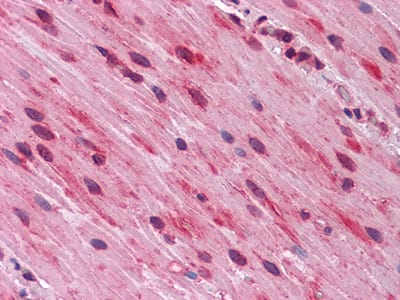
| WB | 咨询技术 | Human,Mouse,Rat |
| IF | 咨询技术 | Human,Mouse,Rat |
| IHC | 1/200 - 1/1000 | Human,Mouse,Rat |
| ICC | 技术咨询 | Human,Mouse,Rat |
| FCM | 咨询技术 | Human,Mouse,Rat |
| Elisa | 1/10000 | Human,Mouse,Rat |
| Aliases | HDR;MGC2346;MGC5199;MGC5445;GATA3 |
| Entrez GeneID | 2625 |
| clone | 7B5 |
| WB Predicted band size | 48kDa |
| Host/Isotype | Mouse IgG1 |
| Antibody Type | Primary antibody |
| Storage | Store at 4°C short term. Aliquot and store at -20°C long term. Avoid freeze/thaw cycles. |
| Species Reactivity | Human |
| Immunogen | Purified recombinant fragment of human GATA3 expressed in E. Coli. |
| Formulation | Purified antibody in PBS with 0.05% sodium azide. |
+ +
以下是3篇关于GATA3抗体的参考文献概览:
1. **文献名称**:*GATA3: A Multispecific But Potentially Useful Marker in Surgical Pathology*
**作者**:Miettinen M, et al.
**摘要**:系统分析了GATA3抗体在多种肿瘤中的表达模式,发现其在乳腺癌、尿路上皮癌及部分神经内分泌肿瘤中高度敏感,但在鳞癌和间叶源性肿瘤中表达缺失,强调了其在鉴别诊断中的价值。
2. **文献名称**:*Utility of GATA3 Immunohistochemistry in Diagnosis of Uncommon Types of Breast Carcinoma*
**作者**:Liu H, et al.
**摘要**:通过检测300余例乳腺癌样本,证实GATA3抗体在浸润性导管癌、小叶癌及化生性癌中的高表达率(>90%),尤其是三阴性乳腺癌中可作为补充诊断标志物。
3. **文献名称**:*GATA3 Expression in Primary Cutaneous Adnexal Neoplasms and Metastatic Breast Carcinomas*
**作者**:Quick CM, et al.
**摘要**:比较了GATA3抗体在皮肤附件肿瘤和转移性乳腺癌中的表达,发现其在乳腺癌转移灶中敏感度高(85%),而皮肤汗腺肿瘤中几乎不表达,支持其用于区分原发与转移性病灶。
4. **文献名称**:*Diagnostic Utility of GATA3 in Urinary Bladder Carcinoma*
**作者**:Higgins K, et al.
**摘要**:评估GATA3抗体在膀胱尿路上皮癌中的诊断效能,结果显示其在低级别和高级别肿瘤中均保持高敏感性(约80%),并优于其他标志物(如p63),推荐用于泌尿病理诊断组合。
(注:以上内容基于已发表研究的核心结论概括,具体引用时请核对原文及发表年份。)
GATA3 antibody is a valuable diagnostic tool in pathology and cancer research, primarily targeting the GATA3 protein—a transcription factor critical for cellular differentiation and tissue development. Belonging to the GATA family of zinc-finger proteins, GATA3 regulates gene expression by binding to DNA sequences containing the "GATA" motif. It plays essential roles in immune system function (e.g., T-cell development), mammary gland maturation, and renal/urinary tract formation.
In clinical diagnostics, GATA3 immunohistochemistry (IHC) is widely used to identify tumor origins, particularly in metastatic cancers. It serves as a sensitive marker for breast carcinomas, especially estrogen receptor (ER)-positive luminal subtypes, and urothelial carcinomas. Its expression helps differentiate primary breast or bladder tumors from morphologically similar malignancies (e.g., lung or gastrointestinal cancers). GATA3 is also expressed in parathyroid tumors, cutaneous adnexal neoplasms, and certain sarcomas.
Research applications include studying GATA3's dual roles—acting as an oncogene in some contexts (e.g., basal-like breast cancer) while functioning as a tumor suppressor in others. Antibody-based detection aids in understanding its involvement in epithelial-mesenchymal transition and therapeutic resistance. Commercial GATA3 antibodies are validated for IHC, Western blot, and flow cytometry, with nuclear staining patterns confirming proper specificity. Interpretation requires correlation with clinical data, as heterogeneous expression may occur in tumors.
×